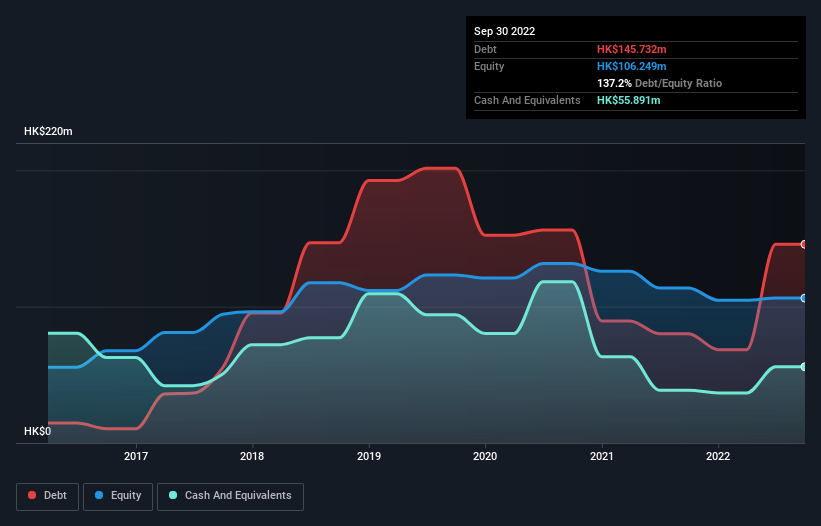
Legendary fund manager Li Lu (who Charlie Munger backed) once said, 'The biggest investment risk is not the volatility of prices, but whether you will suffer a permanent loss of capital.' It's only natural to consider a company's balance sheet when you examine how risky it is, since debt is often involved when a business collapses. We can see that Ching Lee Holdings Limited (HKG:3728) does use debt in its business. But the more important question is: how much risk is that debt creating?
When Is Debt Dangerous?
Debt assists a business until the business has trouble paying it off, either with new capital or with free cash flow. If things get really bad, the lenders can take control of the business. While that is not too common, we often do see indebted companies permanently diluting shareholders because lenders force them to raise capital at a distressed price. Of course, debt can be an important tool in businesses, particularly capital heavy businesses. The first thing to do when considering how much debt a business uses is to look at its cash and debt together.
View our latest analysis for Ching Lee Holdings
What Is Ching Lee Holdings's Debt?
You can click the graphic below for the historical numbers, but it shows that as of September 2022 Ching Lee Holdings had HK$145.7m of debt, an increase on HK$80.1m, over one year. However, it does have HK$55.9m in cash offsetting this, leading to net debt of about HK$89.8m.

How Healthy Is Ching Lee Holdings' Balance Sheet?
According to the last reported balance sheet, Ching Lee Holdings had liabilities of HK$340.0m due within 12 months, and liabilities of HK$297.0k due beyond 12 months. Offsetting this, it had HK$55.9m in cash and HK$283.2m in receivables that were due within 12 months. So these liquid assets roughly match the total liabilities.
Having regard to Ching Lee Holdings' size, it seems that its liquid assets are well balanced with its total liabilities. So it's very unlikely that the HK$122.6m company is short on cash, but still worth keeping an eye on the balance sheet. The balance sheet is clearly the area to focus on when you are analysing debt. But it is Ching Lee Holdings's earnings that will influence how the balance sheet holds up in the future. So when considering debt, it's definitely worth looking at the earnings trend. Click here for an interactive snapshot.
Over 12 months, Ching Lee Holdings made a loss at the EBIT level, and saw its revenue drop to HK$445m, which is a fall of 40%. To be frank that doesn't bode well.
Caveat Emptor
Not only did Ching Lee Holdings's revenue slip over the last twelve months, but it also produced negative earnings before interest and tax (EBIT). Indeed, it lost a very considerable HK$14m at the EBIT level. When we look at that and recall the liabilities on its balance sheet, relative to cash, it seems unwise to us for the company to have any debt. So we think its balance sheet is a little strained, though not beyond repair. Another cause for caution is that is bled HK$37m in negative free cash flow over the last twelve months. So in short it's a really risky stock. The balance sheet is clearly the area to focus on when you are analysing debt. However, not all investment risk resides within the balance sheet - far from it. For example Ching Lee Holdings has 3 warning signs (and 2 which shouldn't be ignored) we think you should know about.
Of course, if you're the type of investor who prefers buying stocks without the burden of debt, then don't hesitate to discover our exclusive list of net cash growth stocks, today.
New: AI Stock Screener & Alerts
Our new AI Stock Screener scans the market every day to uncover opportunities.
• Dividend Powerhouses (3%+ Yield)
• Undervalued Small Caps with Insider Buying
• High growth Tech and AI Companies
Or build your own from over 50 metrics.
Have feedback on this article? Concerned about the content? Get in touch with us directly. Alternatively, email editorial-team (at) simplywallst.com.
This article by Simply Wall St is general in nature. We provide commentary based on historical data and analyst forecasts only using an unbiased methodology and our articles are not intended to be financial advice. It does not constitute a recommendation to buy or sell any stock, and does not take account of your objectives, or your financial situation. We aim to bring you long-term focused analysis driven by fundamental data. Note that our analysis may not factor in the latest price-sensitive company announcements or qualitative material. Simply Wall St has no position in any stocks mentioned.
About SEHK:3728
Ching Lee Holdings
An investment holding company, engages in the provision of construction, consultancy, and project management services primarily in Hong Kong.
Mediocre balance sheet and slightly overvalued.
Market Insights
Community Narratives



